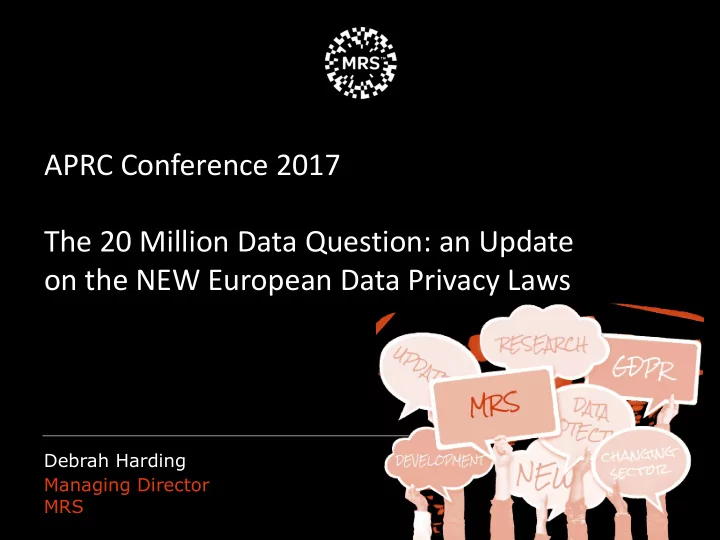

APRC Conference 2017 The 20 Million Data Question: an Update on the NEW European Data Privacy Laws Debrah Harding Managing Director MRS
Topics for today Overview 10 Key elements of the General Data Protection Regulation (GDPR) 10 activities for preparing for GDPR Questions
Some context - 25 th May 2018 - Evolutionary not revolutionary: Fairness, transparency, accuracy, security, minimisation and respect for individuals all remain from current legislation - Strengthened individual rights - Increased business accountability - Embedded privacy-centric focus
Element 1: Extra territorial reach Extra- territorial reach Adequacy for cross- border transfers GDPR comes into force 25 May 2018 5
Element 2: Regulation v. national law - Current privacy framework is a Directive: Each EU state has own law and own interpretation - GDPR is a Regulation adopted by Member States …but Member States can legislate on specific areas including employment and research
Element 3: Privacy by design & default - Philosophical approach: Privacy is a fundamental human right - Privacy by design and default is core to GDPR: Supported on one side by transparency and the other by accountability
Element 4: Definition Of personal data - Definition of personal data has been expanded: Data from which a living individual is identifiable (by anyone) directly or indirectly - Online data which may be personal: Online identifiers, device identifiers, cookies IDs and IP identifiers - Special categories of data (sensitive data): Current classes of data retained and extended to cover genetic and biometric data
Element 5: Children - Children: Children under 13 can never, themselves, give consent to the processing of their personal data in relation to online services For children between 13 and 15 (inclusive) the general rules is that parental consent must be obtained unless Member States legislate to reduce the age threshold Children aged 16 and over may give consent for the processing of their personal data
Element 6: Consent - Consent: Have the right to withdraw consent at any time Presumption that consent will not be valid unless separate consents are obtained for different processing activities Forced or “omnibus” consent mechanisms will not be valid – no pre-ticked boxes or inactivity implying consent Explicit consent for sensitive data
Element 7: Processing using other grounds - Necessary for… the performance of a contract compliance with a legal obligation protect the vital interests of data subject performance of tasks in the public interest purposes of legitimate interests
Element 8: Further processing - New processing purposes are compatible with original data processing purposes: Link between original and proposed purpose Context in which data has been collected The nature of the data The consequences of the proposed processing The existence of safeguards (including pseudonymisation)
Element 9: Data minimisation & pseudonymisation - Data minimisation: Personal data must be adequate, relevant and limited - Pseudonymisation: Personal data that has been processed so that it can no longer be attributed to a specific data subject without the use of additional information
Element 10: Enhanced rights and fines - The current individual rights remain, plus some are enhanced. Rights include: Right to be forgotten Right to request the porting of data to a new organisation Right to object to certain processing activities Right to object to decisions taken by automated means
Element 10: Enhanced rights and fines - Fines may be imposed instead of, or in addition to, measures that may be ordered by supervisory authorities. There are two tiers of administrative fines: Some contraventions will be subject to administrative fines of up to €10,000,000 or , 2% of global turnover, whichever is the higher Others will be subject to administrative fines of up to €20,000,000 or 4% of global turnover, whichever is the higher
10 Next Steps 1. Determine whether GDPR affects your organisation It is does… 2. Conduct an information audit inc. subcontractors 3. Understand the legal grounds for collecting data 4. Review and strengthen your IT arrangements 5. Review your policies, processes and training 6. Determine if you need a Data Protection Officer 7. Build a comprehensive privacy compliance structure 8. Prioritise on areas with highest risks and impact 9. Instigate and conduct Privacy Impact Assessments 10. Prepare for data breach notifications
GDPR: Ongoing initiatives GDPR Code of Conduct (EFAMRO/ESOMAR) Research Exemption Lobbying (MRS/EFAMRO/ESOMAR) Regulatory Guidance 3 MRS Guides issued Legitimate Interests Legitimate Interests so far WG WG Consultations (MRS/IAF) (MRS/DPN) (MRS/EFAMRO/ /A29WP)
Any questions?
Recommend
More recommend